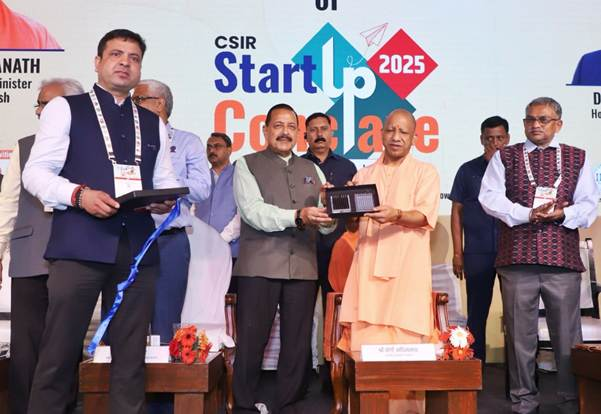Lucknow Hosts Startup Conclave, Inaugurates India’s First Swastik Lotus Garden
Dr. Singh highlighted that nearly 50% of India’s startups now come from smaller towns and cities, with 60% led by women entrepreneurs.

- Country:
- India
The city of Lucknow became the focal point of India’s innovation and entrepreneurship journey as Union Minister of Science & Technology Dr. Jitendra Singh and Uttar Pradesh Chief Minister Yogi Adityanath jointly addressed the two-day Startup Conclave organized by the Ministry of Science & Technology, Government of India. Alongside the conclave, Dr. Singh also inaugurated India’s first Swastik-shaped Lotus Garden at the CSIR-National Botanical Research Institute (NBRI), a unique facility that blends biodiversity conservation with cultural symbolism and economic opportunity.
India’s First Swastik Lotus Garden
Spread over 930 sq. m, the Swastik Lotus Garden is the first of its kind in the country. It showcases 60 varieties of lotus sourced globally and 50 taxa of water lilies, preserved through advanced scientific techniques including genetic conservation methods, controlled light exposure, and specialized treatments.
The garden’s centrepiece is the Namoh 108 lotus, the world’s first 108-petal lotus developed by NBRI scientists in Lucknow. This creation has not only enriched biodiversity but also become a symbol of India’s cultural and scientific innovation.
Dr. Jitendra Singh noted that the garden will serve as:
-
A hub for biodiversity conservation.
-
A platform for entrepreneurship in floriculture, wellness, and agri-industries.
-
A new tourism attraction for Lucknow.
“This is not only a conservation effort, but also a platform for new livelihoods in floriculture and allied industries. It symbolizes the government’s vision of linking science with people’s lives,” he said.
Startup Conclave: Science Meets Entrepreneurship
The CSIR Startup Conclave 2025 brought together scientists, entrepreneurs, industry representatives, and young innovators. Addressing the gathering, Chief Minister Yogi Adityanath praised CSIR’s initiatives and assured full state government support, noting that Uttar Pradesh’s institutional strength and skilled manpower make it a natural leader in India’s startup revolution.
Dr. Singh explained that hosting the conclave in Lucknow was part of the government’s strategy to decentralize science and innovation events, taking them beyond Delhi to aspirational cities such as Jammu, Hyderabad, Mumbai, Bhubaneswar, and now Lucknow.
The Rise of Tier-2 and Tier-3 Startups
Dr. Singh highlighted that nearly 50% of India’s startups now come from smaller towns and cities, with 60% led by women entrepreneurs. He credited Prime Minister Modi’s Startup India initiative (2015) for transforming the landscape from just 350 startups in 2015 to over 2 lakh today, a change that redefined employment and entrepreneurship in India.
CSIR’s Contributions from Lucknow
The Minister spotlighted significant innovations from CSIR institutions in Lucknow, including:
-
Namoh 108 Lotus and advances in floriculture under the Floriculture Mission, creating new farmer livelihoods.
-
Pest-resistant cotton varieties.
-
13 new pharmaceutical drug candidates developed locally, targeting cancer, fatty liver disease, and other conditions.
-
Lucknow’s legacy in developing Menthol products and Mint lozenges, now globally consumed, with ongoing research into herbal mouth fresheners and new value-added products.
Dr. Singh remarked, “Lucknow is not only about monuments like the Imam Bara. It is also about scientific innovations like the 108-petal lotus and mint-based products. This is the face of New India.”
Youth, Industry, and the Road to Viksit Bharat
Stressing the role of youth, Dr. Singh reminded the audience that entrepreneurship does not demand advanced degrees:
“Many successful startups are driven by young people without PhDs, but with the skill and focus to innovate. The ecosystem created by Prime Minister Modi provides funding, training, and mentoring to anyone with talent.”
He urged stronger industry–research linkages, advocating that every new experiment should be connected with industry from day one. He envisioned today’s youth carrying India’s scientific and entrepreneurial flag high by 2047, when the nation marks 100 years of independence, in line with the vision of Viksit Bharat.
Long-Term Science and Tech Push in Uttar Pradesh
The Minister also outlined the government’s long-term commitments in the state, including:
-
Establishing the first National Quantum Mission Centre in Noida.
-
Reviving Central Electronics Limited (CEL) into a profit-making enterprise.
-
Plans for a biotechnology industrial park and a science museum in Lucknow.
The dual highlights of the event—the inauguration of the Swastik Lotus Garden and the Startup Conclave 2025—demonstrated the government’s approach of linking science, culture, entrepreneurship, and livelihoods. Lucknow, already known for its rich heritage, is now emerging as a modern hub of innovation, biodiversity, and startups, embodying the spirit of New India.
ALSO READ
Restoring Reverence: Yogi Adityanath's Call to Honor Desecrated Heritage Sites
Restoration of Religious Heritage: Yogi Adityanath's Call for Cultural Revival
Pioneering Healthcare Innovations: Yogi Adityanath's Vision for Uttar Pradesh
Honoring a Legacy: Yogi Adityanath Pays Tribute to Mahant Avedyanath
Honoring Legacy: Yogi Adityanath's Tribute to Sanatan Dharma Icons










